新编实用英语综合教程1第四版Unit1
unit 1 新编实用英语综合教程
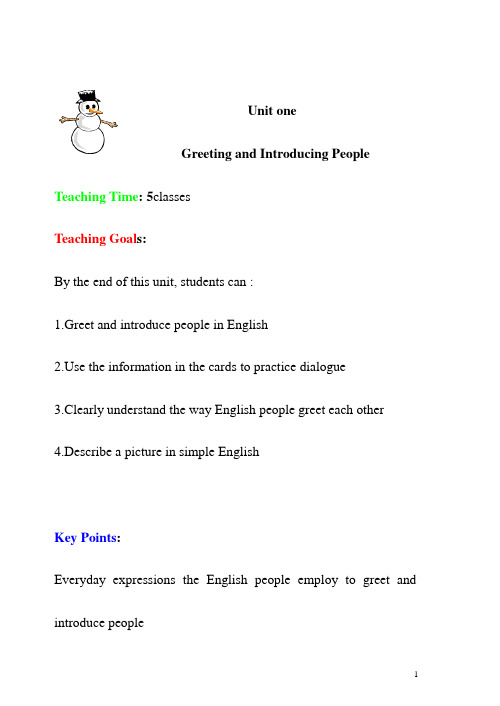
Unit oneGreeting and Introducing People Teaching Time: 5classesTeaching Goal s:By the end of this unit, students can :1.Greet and introduce people in Englishe the information in the cards to practice dialogue3.Clearly understand the way English people greet each other4.Describe a picture in simple EnglishKey Points:Everyday expressions the English people employ to greet and introduce people1st class: 50ms. Talking Face to FaceStep 1 . PresentationⅠ. Introducing myself according to my calling card: Good morning / afternoon, boys and girls! Nice to meet.Welcome to our college! My name is Yao fangfang . My English name is Yvonne. You can call me Mrs Yao or Yvonne as you like. From now on, we will be together through this term. I hope we can get well on with each other. I believe so! At last, I would like to give you my heartfelt wishes for you. May you have good study and campus life here.Ⅱ.Show them my calling card and explanation:first name/given name; (given at baptism)名last name/ family name:姓eg: Eliot T. SamuelⅢ.Give some useful expressions of greeting:A: Meeting people for the first timeHi / hello, nice to meet you. ( nice/glad/ honoured )Or:How do you do?How do you do?B: Meeting people againLong time no see/ how are you/ how have you been?It’s been quite a while, hasn’t it?How are you? Fine / nice/ pretty good/ not so bad/ just so so/ very well.That’s all right.How is your work / family?Ⅳ. Let students introduce themselves to me!Use the expression above.Step 2. Learn the samplesDialogue 1/ Dialogue 2.Ask students read them aloud and then practice them in pairs.Give some advice on how to learn English well.Four basic skills: Read, listening speaking and writing.Step 3. Act out ( homework)Look through and give the task to the students.Practice them in next class.Step 4 ..Homework: read aloud and learn by heart the “data bank”2nd class: Being All EarsKey language points1.leave a good impression upon sb.Your proper greeting leaves a good first impression upon me.2. rather3.each +V single4.that cool but inexperienced man5.I’ve got to6.speak of : mention7. nice to have met you.Step 1: Review check the homework. Act outStep 2. Listen to the dialogue and decode (twice)Step 3. Listen and respondListen to the dialogue again and answer the following questionsStep 4.Listen and completeNow listen to dialogue and complete the following sentences. Step 5. Listen and judge.Step 6.Read—listen—match and concludeMaterial: Introduction are important. P7Section Ⅲ( 3rd and 4th .5 classes) Maintaining a sharp eye Mr.: a courtesy title for any male adult not for styled sir”, “Dr”etc, used before the man’s family name or his position.b.Mrs.:“太太”a courtesy title for any married woman not styled“Lady”,“Dr.”etc.used before her husband’s .surname c.Ms.:“女士”a courtesy bile for a woman,whether she is married or not,followed by the family name.Miss:“小姐”A title to address an unmarried woman or a girl.It is followed by the family name.Miss can also be used as he title of address to an (esp.unknown)unmarrined woman. In this case,it is not followed by the name.l. Explanation of Difficult Sentences.1.(Title)The Way Americans GreetAnalysis:In this title,in which is omitted after the way> in…way means( to do sth ) by means of means a certain method美国人致意的方式Example:I think the way she runs her bookshop is worth studying.2. Speaking of time. I’ve got to run.A present participle clause used as an adverbial of cause/time. It means “ when it comes to time, I am reminded of…”说到时间,我得赶紧跑了。
新编实用英语综合教程1(第四版)Unit 1 Hello,Hi教案
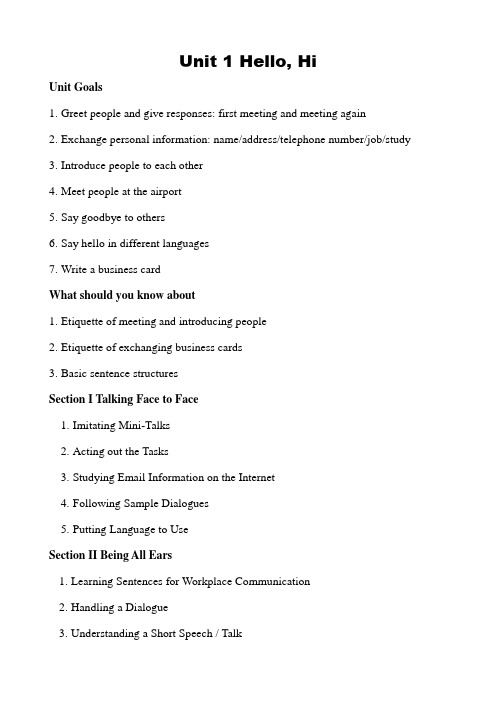
Unit 1 Hello, HiUnit Goals1.Greet people and give responses: first meeting and meeting again2.Exchange personal information: name/address/telephone number/job/study3.Introduce people to each other4.Meet people at the airport5.Say goodbye to others6.Say hello in different languages7.Write a business cardWhat should you know about1.Etiquette of meeting and introducing people2.Etiquette of exchanging business cards3.Basic sentence structuresSection I Talking Face to Face1.Imitating Mini-Talks2.Acting out the Tasks3.Studying Email Information on the Internet4.Following Sample Dialogues5.Putting Language to UseSection II Being All Ears1.Learning Sentences for Workplace Communication2.Handling a Dialogue3.Understanding a Short Speech / TalkSection III Trying your Hand1.Practicing Applied Writing2.Writing Sentences and Reviewing GrammarSection IV Maintaining a Sharp EyePassage 1 :Information Related to the Reading PassageEnglish Expressions Borrowed from FrenchOver the long years, the English language has borrowed a great number of French words or expressions. Some of them have been so absorbed in English that speakers might not realize their origin. Other expressions like “faux pas〞have retained their “Frenchness〞, with which speakers tend to sound modern. These expressions are often written in italics. The following are a few French expressions which are commonly used in English.1. Faux Pas: It refers to a socially awkward or tactless act, a foolish mistake, something that should not be done. 失礼2. au pair: A foreign female student who works for a family (cleaning and/or teaching the children) in exchange for room and board. 帮助料理家务换取住宿的外国女学生3. Bon appétit: The closest English equivalent is “Enjoy your meal〞. 用餐愉快4. esprit de corp s: It is similar to “group spirit〞or “morale〞. 团队精神5. rendez-vous: In English it means “go to〞. It can be used as a noun or a verb. 约会6. RSVP: This abbreviation stands for Répondez, s'il vous plaît, which means“Respond, please〞.敬请回复7. bon voyage: a way of saying goodbye and wishing good luck 一路平安The Business Card: a Social Faux PasYou, like most people, probably have been in such a situation where you are being asked for a business card, and while reaching for it ... and ... oops ... “I'm sorry, I must be out at the moment〞or “they must be in my other bag〞or “I left them at the office, I'm sorry,〞and the conversation continues on with some sort of story about how this “never happens to me〞or “I knew I was forgetting something this morning ...〞Missed connections are missed opportunities for business. Business cards are a useful marketing tool, and an easy one to have with you at all times. Not having your cards can be seen as being unprepared to market yourself and your business. Don't start t hat new contact leaving them thinking “that person is already unprepared〞.“Never leave home without it ...〞There are so many things we often have to remember in this go-go world we are living in … but your business cards should ALWAYS be with you.Here are a few tips for you to go take care of this right now, so youdon't get caught in this situation:✧ If you don't have a job, get Networking Cards.✧ If you are employed, and haven't had new cards in 2 or more years,it couldbe time for an update: info update and photo update ...✧ Perhaps set a goal of handing out 5 cards a day.✧ Practice what you will say when handing them out. On a daily basis, there are so many opportunities to do so. Grocery store lines, coffee shops, waiting on your car wash, meetings, and even the dog park!✧ Ask your network to network with and for you also by handing out a few!Work smarter, not necessarily harder!Language Points1 Explanation of Difficult Sentences1. (Para. 2) Missed connections are missed opportunities for business.Analysis: Missed is a verb's past participle used here as an adjective.The repeated use of the same word could bring out a stronger effect. Translation: 错失了联络就错失了商机。
新编实用英语综合教程第四版Unit演示文稿

5 Task:
Back
Complain about a cold day.
Studying Weather Forecasts
Study and Imitate
3 A weather forecast is a statement that tells the public what the weather condition is going to be. We need to watch weather forecasts on TV or hear them over the radio every day. It is part of our life. Read the following samples of weather forecasts carefully and try to use the information to practice short dialogues.
Speak and Complete Speak and Communicate
SECTION I Talking Face to Face
Imitating Mini-Talks
Speak and Recite
1 Work in pairs. Practice the following mini-talks about weather conditions
宜人的
4) Making Comments on the Weather A: What do you think of the weather here? B: Neither too hot in summer nor too cold in winter. A: Yes, pretty agreeable. People love it. B: Me, too.
新编实用英语综合教程1第四版Unit1

新编实用英语综合教程1第 四版Unit1
Unit | One
新编实用英语综合教程1第 四版Unit1
Back
Unit | One
Putting Language to Use
5 Imagine you are meeting an English teacher from the USA at the airport. Read aloud the following dialogue with your partner by putting in the missing words.
新编实用英语综合教程1第四版 Unit1
Unit | One
新编实用英语综合教程1第 四版Unit1
Unit | One
Talking Face to Face
Section Ⅰ
Contents
Section Ⅴ
Appreciating Culture Tips
Section Ⅱ
Being All Ears
3 Business cards are very useful for introducing people. Read the following cards carefully and try to use the information to practice short dialogues.
my card.
我的名片。
4) Glad to meet you, Paul. Here is my 4) 保罗,见到你很高兴。这是我的名片。
card.
5) How are you, Jack? Nice to see you 5) 杰克,你好吗?再次见到你真高兴。
You: Hello, are you Prof. Smith from the United States?
实用英语1课后习题答案(unit_1_unit_5)

新编实用英语综合教程1课后翻译答案(Unit 1-Unit 5 )UNIT 11像许多人一样,你大概也在学习如何推销自己•You, like most people, probably are leanning how to market yourself.2对一名新雇员来说,最重要的不一定是工作经验,而是怎样不断更新知识。
To a new employee, the most importa nt is not n ecessarily work experie nee, but how to update kno wledge.3对不起,我那位闲不住的老板让我立刻就走。
I'm so sorry. My go-go boss asks me to leave right now.4那位主妇只是不停地诉说她的家事,我就知道我会被拉进这样的谈话。
That housewife just eontinued on with some sort of story about her family. I knew I must be eaught in such a conv ersati on.5对我来说,失去时间就是失去生命。
我不能还没实现自己设定的目标就离开这个世界。
For me, missed time is missed life. I can not leave this world without reaching the goal I set.6我的锻炼计划是建立在每天锻炼基础上的,它不一定会让我长高,但会使我身体健康。
My exercise plan is built on a daily basis. It could help me become healthier, not n ecessarily taller.1. 像你的许多同学一样,你可能也曾有过亲身经历:有人请求你为外国友人帮忙做点事像大部分妇女一样,她自己可能也曾遭遇过被人误解的局面。
新编实用英语综合教程1第四版课文翻译

新编实用英语综合教程1第四版课文翻译There is no perfect way for human beings to deal with cockroaches up to now. There is an instrument in Europe that can emit a specific frequency wave similar to that in a microwave oven, rapidly raise the blood temperature in the cockroach's body and instantly cause the cockroach to blow itself up. However, even if it is applied in such a wide range, it cannot completely eliminate the cockroach. Moreover, it can kill any organism containing water in the body and was banned several years ago. I do not recommend you to use any insecticide, which can only kill some cockroaches. It is an indisputable fact that cockroaches cannot be completely eliminated, but it can accelerate the evolution of cockroaches. The same insecticide may be used for one to two years, and cockroaches will be immunized against this insecticide by producing antibodies themselves. If you kill a limited number of cockroaches, the evolution of cockroaches will be accelerated permanently. Suggested methods are as follows: 1. Overcome your fear of cockroaches. 2. Use aggressive weapons to cause physical damage to cockroaches to death. (For example, newspapers, flyswatters.) 3. Clean the house and keep the house clean all over the world to minimize the living space of cockroaches. Finally, I give you advice: if you find a cockroach in the room, you think there are more than 200 cockroaches nearby. The number of cockroaches on theearth is far more than N times of the number of human beings. This is an endless war. ok, take your weapons and do them.人类对付蟑螂的方法到现在没有完善的. 在欧洲有种仪器,能发出类似微波炉中的特定频率波,迅速声高蟑螂身体内的血液温度,瞬间让蟑螂自爆,可即使这样大范围应用也不能彻底消灭蟑螂,而且,它可以杀掉任何身体中含水的生物,在几年前以遭禁用. 本人不推荐你使用任何杀虫剂,杀虫剂只能杀死一部分蟑螂,不能完全消灭蟑螂,这是不争的事实,但是他能加速蟑螂的进化,同一杀虫剂可能用一到两年后,蟑螂自身产生抗体,就对这种杀虫剂免疫了.你杀死了有限的蟑螂,可加速蟑螂的进化是永久的. 推荐你的方法如下: 1,克服自身对蟑螂的恐惧. 2,使用带攻击性武器对蟑螂造成物理伤害至死.(例如:报纸,苍蝇拍.) 3,清洁房屋卫生及房屋周遍卫生,尽量减少蟑螂的生存空间. 最后给你忠告: 如果你发现房间里有一只蟑螂,就以为着附近还有200只以上.蟑螂在地球上的数量远远超过人类的数量n倍.这是一场永无止境的战争,ok,拿去武器,去干他们吧。
新编实用英语综合教程Unit 1
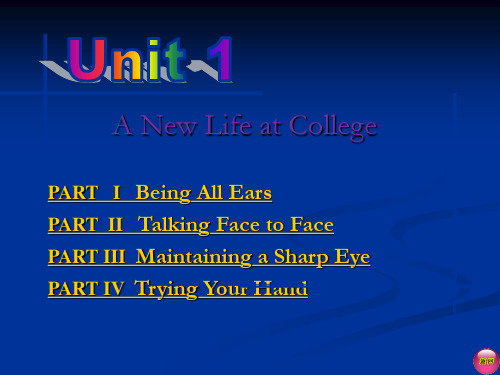
英语听力练习方法之——逆序听力 法
第一,选择听力材料要符合个人实际水平。 太难或太轻易都不好。 第二,反复听十遍还听不清楚,就要查对 原文,以便搞清问题出在那里。有针对性 地学习。 第三,练习完整地听懂一句话之后再默写。 第四,大声跟读。可以边看着记录稿,边 跟播音员朗读。并把自己的声音录下来, 纠正语音。
A New Life at College
PART I Being All Ears
PART II Talking Face to Face PART III Maintaining a Sharp Eye PART IV Trying Your Hand
PART I
Being All Ears
Greetings and Addressing Words to Know Short Conversations Situational Dialogues Passage Listening
Situational Dialogues
Dialogue 1
You will hear a dialogue between Peter and Henry. They happen to meet in the street one day.
1. Where did Peter go? A. Beijing. B. New York.
Passage Listening
PART II
Talking Face to Face
Greetings and Addressing
Follow the samples
Useful Sentences and Expressions
提高口语的方法
新编实用英语综合教程1第1单元部分教案
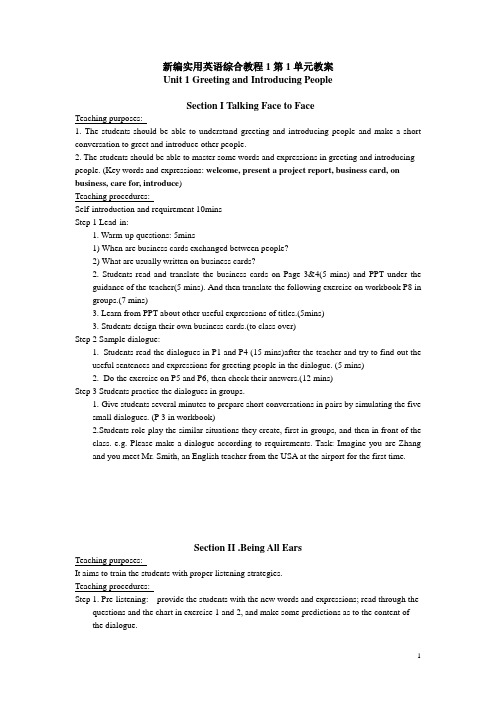
新编实用英语综合教程1第1单元教案Unit 1 Greeting and Introducing PeopleSection I Talking Face to FaceTeaching purposes:1. The students should be able to understand greeting and introducing people and make a short conversation to greet and introduce other people.2. The students should be able to master some words and expressions in greeting and introducing people. (Key words and expressions: welcome, present a project report, business card, on business, care for, introduce)Teaching procedures:Self-introduction and requirement 10minsStep 1 Lead-in:1. Warm-up questions: 5mins1) When are business cards exchanged between people?2) What are usually written on business cards?2. Students read and translate the business cards on Page 3&4(5 mins) and PPT under theguidance of the teacher(5 mins). And then translate the following exercise on workbook P8 in groups.(7 mins)3. Learn from PPT about other useful expressions of titles.(5mins)3. Students design their own business cards.(to class over)Step 2 Sample dialogue:1. Students read the dialogues in P1 and P4 (15 mins)after the teacher and try to find out theuseful sentences and expressions for greeting people in the dialogue. (5 mins)2. Do the exercise on P5 and P6, then check their answers.(12 mins)Step 3 Students practice the dialogues in groups.1.Give students several minutes to prepare short conversations in pairs by simulating the fivesmall dialogues. (P 3 in workbook)2.Students role-play the similar situations they create, first in groups, and then in front of theclass. e.g. Please make a dialogue according to requirements. Task: Imagine you are Zhang and you meet Mr. Smith, an English teacher from the USA at the airport for the first time.Section II .Being All EarsTeaching purposes:It aims to train the students with proper listening strategies.Teaching procedures:Step 1. Pre-listening: provide the students with the new words and expressions; read through the questions and the chart in exercise 1 and 2, and make some predictions as to the content of the dialogue.(Key words and expressions:1.Canada/The United States (of America) / the United Kingdom (of Great Britain andNorthern Ireland); England--Scotland--Welsh--Northern Ireland ;Britain;2.College3.Surprise surprise partyHis visit gave me a pleasant surprise. 他的来访使我感到惊喜。
新编实用英语综合教程Unit1 Greetings and Introductions 重点短语句型

U1 Greetings and IntroductionsKey points from the text book:Business card International Exchange SectionOn business International Fair Same old thingAn overseas studentA third-year student Intend to do sthBachelor’s degree Master’s degree Doctor’s degreeFrom now onKeep in touch with sb At any timeBe of some helpSales clerkLeave a nice first impression upon Speaking of timeHave a quick look at sth Get toGet acquainted with sbDark brownChange one’s mind Under control Change intoBe born in spOn the top of my head Long time no see.Oh, it’s you.I’m here for the conference.Haven’t seen you for ages. What a pleasant surprise! What brings you here? Would you care for a drink?They introduce themselves to each other with pleasure.A proper introduction will leave a good first impression upon others.They prefer first names to formal titles in most cases. Such questions may be too personal to Europeans, but Americans do sometimes ask such questions.P10 NO.4: 1-8I try to be kind to other people, but sometimes I’m very stubborn and never change my mind.I like everything under control.I become a different person at home.Even though I enjoy working very hard each day at the university, I still feel that my family is more important than anything else.Key points from the blue book:Task2 & task7。
新编实用英语综合教程 第四版Unit

Contents
Talking Face to Face
Section Ⅰ
Section Ⅱ
Being All Ears
Section Ⅲ
Section Ⅴ
Appreciating Culture Tips
Section Ⅳ
Maintaining a Sharp Eye
Trying Your Hand
Back
Unit | Five
Acting out the Tasks
Speak and Perform 2 Work in pairs and act out the tasks by following the above mini-talks.
1 Task: Ask for Mark's comments on the weather.
2 Task: Ask about and describe the weather at this time of year.
3 Task: Ask Mr. Green about the weather condition tomorrow and plan an activity.
4 Task: Talk about the change of the weather from long rainy days.
Back
Unit | Five
Speak and Communicate
6 There is going to be a sports meet tomorrow. Bob is worried about the weather and you are talking about it. Fill in the blanks according to the clues given in the brackets. Then act it out with your partner. Bob: I'm wondering if it is going to be fine tomorrow.
实用英语综合教程1_第四版_Unit_1Text_A

Text-Related Information
Text-Related Information
Examples of community service projects include:
• Cleaning a park. • Collecting items for charity such as clothle comes naturally to most of us. If we see a blind person getting off a bus, we watch to
make sure that he is in no danger of falling. Members of a family help one another, with particular care for the very young and the elderly.
While-Reading Task
A helping hand and a friendly face can mean a great deal to a lonely elderly person.
4 Handicapped people may be young or old. People confined to wheelchairs cannot go out unless somebody takes them. Blind children may love swimming but they need a sighted swimmer to go with them. Some handicapped people may be unable to go out at all and a visitor is then more than welcome. Voluntary help is needed in hospitals. There are library and shop trolleys to be taken round the wards and at Christmas time decorations to be put up and parties and concerts to be organized. Some volunteers help to run playgrounds for young children during school holidays and also look after children in preschool play groups.
新编实用英语综合教程(第四版)上册 Unit1-Unit3 课文段落翻译
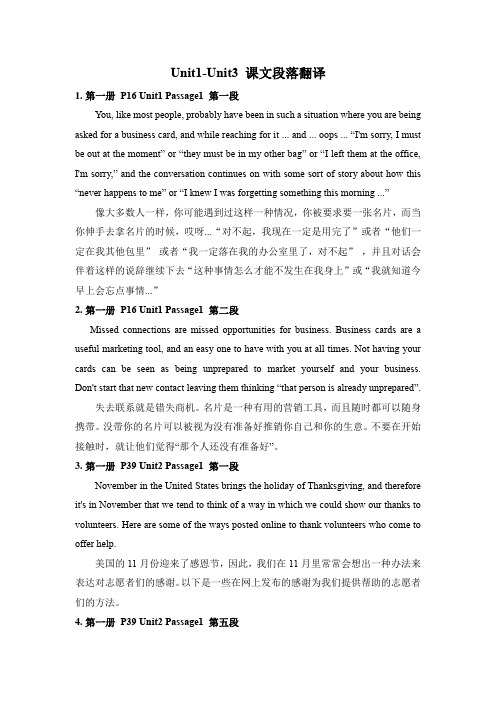
Unit1-Unit3 课文段落翻译1.第一册P16 Unit1 Passage1 第一段You, like most people, probably have been in such a situation where you are being asked for a business card, and while reaching for it ... and ... oops ... “I'm sorry, I must be out at the moment” or “they must be in my other bag” or “I left them at the office, I'm sorry,” and the conversation continues on with some sort of story about how this “never happens to me” or “I knew I was forgetting something this morning ...”像大多数人一样,你可能遇到过这样一种情况,你被要求要一张名片,而当你伸手去拿名片的时候,哎呀...“对不起,我现在一定是用完了”或者“他们一定在我其他包里”或者“我一定落在我的办公室里了,对不起”,并且对话会伴着这样的说辞继续下去“这种事情怎么才能不发生在我身上”或“我就知道今早上会忘点事情...”2.第一册P16 Unit1 Passage1 第二段Missed connections are missed opportunities for business. Business cards are a useful marketing tool, and an easy one to have with you at all times. Not having your cards can be seen as being unprepared to market yourself and your business. Don't start that new contact leaving them thinking “that person is already unprepared”.失去联系就是错失商机。
新编实用英语综合教程一重点单词

新编实用英语综合教程一重点单词Unit 1: Communication1. Communication - the act of sharing or exchanging information, ideas, or feelings through speech, writing, or other methods.2. Verbal - relating to or consisting of words, spoken or written.3. Nonverbal - not involving or using words; not able to speak.4. Gesture - a movement of part of the body, especially a hand or the head, to express an idea or meaning.5. Intonation - the rise and fall of the voice in speaking, giving meaning to words or sentences.6. Pronunciation - the way in which a word or language is spoken.7. Idiom - a group of words established by usage as having a meaning not deducible from those of the individual words (e.g., "kick the bucket" means to die).8. Slang - informal language that is more common in speech than in writing and typically restricted to a particular group of people.9. Jargon - special words or expressions used by a profession or group that are difficult for others to understand.10. Paraphrase - express the meaning of something using different words, especially to achieve greater clarity.11. Feedback - information about reactions to a product, a person's performance of a task, etc., used as a basis for improvement.12. Barriers - obstacles that prevent communication from being successful, such as language differences or cultural misunderstandings.Unit 2: Jobs and Careers1. Occupation - a person's regular work or profession; job or career.2. Profession - a paid occupation, especially one that involves prolonged training and a formal qualification.3. Employment - the state of having paid work.4. Unemployment - the state of not having paid work.5. Entrepreneur - a person who sets up a business or businesses, taking on financial risks in the hope of profit.6. Resume - a brief summary of an individual's education, qualifications, and previous experience, typically sent with a job application.7. Interview - a formal meeting in which one or more people question, consult, or evaluate another person.8. Career - an occupation undertaken for a significant period of a person's life and with opportunities for progress.9. Job satisfaction - the feeling of fulfillment or enjoyment that a personderives from their work.10. Promotion - the action of raising someone to a higher position or rank within an organization.11. Retirement - the action or fact of ceasing to work due to old age or other reasons.Unit 3: Education1. Education - the process of receiving or giving systematic instruction, especially at a school or university.2. Curriculum - the subjects or topics taught in a school or college.3. Grade - a level of study in an educational institution.4. Homework - tasks assigned to students by school teachers that are intended to be carried out outside of class time.5. Lecture - an educational talk to an audience, especially one of students ina university or college.6. Textbook - a book used as a standard source of information on a particular subject.7. Exam - a formal test of a person's knowledge or proficiency in a particular subject or skill.8. Degree - a qualification awarded to students by a college or university, usually after completing a course of study.9. Major - the subject area that a student specializes in while pursuing a degree.10. Minor - a secondary area of study chosen in addition to a major.Unit 4: Health and Fitness1. Health - the state of being free from illness or injury; a person's mental or physical condition.2. Fitness - the condition of being physically fit and healthy.3. Diet - the kinds of food that a person, animal, or community habitually eats.4. Exercise - activity requiring physical effort, carried out to sustain or improve health and fitness.5. Nutrition - the process of providing or obtaining the food necessary for health and growth.6. Weight - a measurement of how heavy someone or something is.7. Stress - a state of mental or emotional strain or tension resulting from adverse or demanding circumstances.8. Sleep - a naturally recurring state characterized by reduced consciousness and inactivity of the body.9. Disease - a disorder of structure or function in a human, animal, or plant,especially one that produces specific signs or symptoms.10. Allergy - a damaging immune response by the body to a substance to whichit has become hypersensitive.Unit 5: Food and Drink1. Cuisine - a style or method of cooking, especially as characteristic of a particular country, region, or establishment.2. Recipe - a set of instructions for preparing a particular dish.3. Ingredient - any of the foods or substances that are combined to make a particular dish.4. Appetizer - a small dish of food or a drink taken before a meal tostimulate one's appetite.5. Main course - the principal item of food in a meal.6. Dessert - a sweet course eaten at the end of a meal.7. Beverage - a drink, especially one other than water.8. Fast food - easily prepared processed food served in snack bars and restaurants as a quick meal.9. Vegetarian - a person who does not eat meat or fish.10. Organic - relating to or derived from living matter, produced or involving production without the use of chemical fertilizers, pesticides, or other artificial agents.Unit 6: Technology and Innovation1. Technology - the application of scientific knowledge for practical purposes, especially in industry.2. Innovation - the action or process of introducing new ideas, methods, or things.3. Computer - an electronic device that manipulates information or data, typically performing calculations or series of operations known as programs.4. Internet - a global computer network providing a variety of information and communication facilities, consisting of interconnected networks using standardized communication protocols.5. Smartphone - a mobile phone that performs many of the functions of a computer, typically having a touchscreen interface, internet access, and an operating system capable of running downloaded applications.6. Software - the programs and other operating information used by a computer, which are given to it or carried in it when it is switched on.7. Hardware - the physical components of a computer or other electronic device.8. Cloud computing - the practice of using a network of remote servers hosted on the Internet to store, manage, and process data, rather than a local server or a personal computer.9. Artificial intelligence - the theory and development of computer systems able to perform tasks that normally require human intelligence, such as visual perception, speech recognition, decision-making, and translation between languages.10. Cybersecurity - the protection of computer systems and networks against information disclosure, damage, or disruption.Unit 7: Environment and Sustainability1. Environment - the surroundings or conditions in which a person, animal, or plant lives or operates.2. Sustainability - the ability to be maintained at a certain rate or level; the avoidance of the depletion of natural resources in order to maintain an ecological balance.3. Pollution - the presence or introduction into the environment of a substance or thing that has harmful or poisonous effects.4. Climate change - long-term alteration of temperature and typical weather patterns in a place or region.5. Renewable energy - energy derived from natural resources that are naturally replenished, such as sunlight, wind, rain, tides, waves, and geothermal heat.6. Conservation - the preservation, protection, or restoration of the natural environment and of wildlife.7. Recycle - convert (waste) into reusable material.8. Compost - decayed organic matter used as fertilizer, especially a mixture of decaying vegetable matter and manure, commonly used in gardening and agriculture.9. Carbon footprint - the total amount of greenhouse gases produced directly and indirectly by something, expressed as carbon dioxide equivalent.10. Greenhouse gas - a gas that contributes to the greenhouse effect, such as carbon dioxide, methane, or nitrous oxide.Unit 8: Travel and Tourism1. Travel - make a journey from one place to another.2. Tourism - the activity of traveling for pleasure or business; the provision of services for this activity.3. Destination - a place to which someone is traveling or where something is being sent; the ultimate objective of a journey.4. Accommodation - a room, group of rooms, or building in which someone lives or stays.5. Transportation - the action of transporting someone or something or the process of being transported.6. Itinerary - a plan for a journey or route taken by a traveler.7. Attraction - a place that is interesting or beautiful and makes people want to visit it.8. Culture - the arts, customs, and habits that characterize a particular society or social group.9. Visa - an official authorization appended to a passport, permitting the bearer to enter the country issuing it.10. Currency - the system of money used in a country.Unit 9: Art and Entertainment1. Art - the expression or application of human creative skill and imagination, typically in a visual form such as painting or sculpture, producing works tobe appreciated primarily for their beauty or emotional power.2. Entertainment - the action of providing or being provided with amusement or enjoyment.3. Music - vocal or instrumental sounds (or both) combined in such a way as to produce beauty of form, harmony, and expression of emotion.4. Film - a movie; a motion picture.5. Theater - a building or outdoor area in which plays, and other dramatic performances are given.6. Dance - an artistic form of nonverbal communication characterized primarily by the use of movements of the body.7. Literature - written works, especially those considered of superior or lasting artistic merit.8. Museum - a building in which objects of historical, scientific, artistic,or cultural interest are stored and exhibited.9. Gallery - a room or building for the display or sale of works of art.10. Performance - a performance of music, drama, or dance.。
新编实用英语英语教程第1册教案Unit1
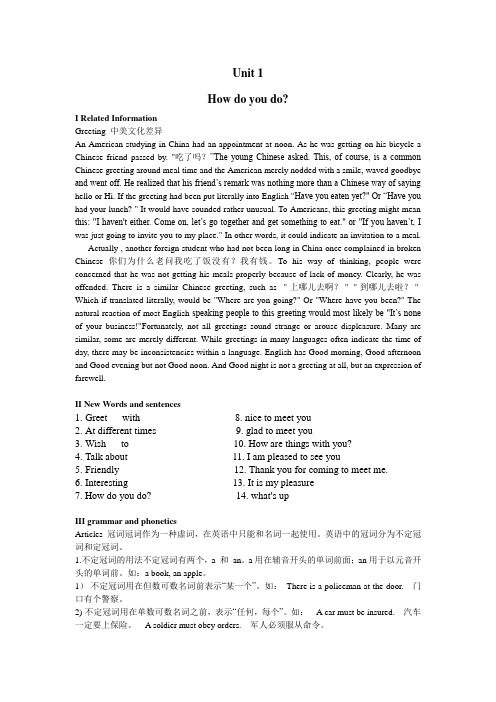
Unit 1How do you do?I Related InformationGreeting 中美文化差异An American studying in China had an appointment at noon. As he was getting on his bicycle a Chinese friend passed by. "吃了吗?”The young Chinese asked. This, of course, is a common Chinese greeting around meal time and the American merely nodded with a smile, waved goodbye and went off. He realized that his friend’s remark was nothing more than a Chinese way of saying hello or Hi. If the greeting had been put literally into English "Have you eaten yet?" Or “Have you had your lunch? " It would have sounded rather unusual. To Americans, this greeting might mean this: "I haven't either. Come on, let’s go together and get something to eat." or "If you haven’t, I was just going to invite you to my place." In other words, it could indicate an invitation to a meal.Actually , another foreign student who had not been long in China once complained in broken Chinese 你们为什么老问我吃了饭没有?我有钱。
实用英语综合教程第一册第一单元
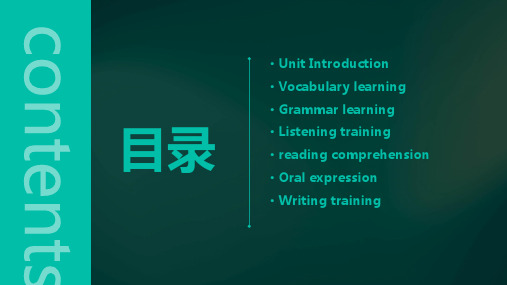
05 reading comprehension
Reading materials
选择合适的阅读材料
选择适合学习者水平的文章,可以是新闻报道、短篇小说、 科普文章等。确保文章内容有趣、相关,能够吸引读者的 注意力。
材料的难度
根据学习者的实际英语水平,选择难度适中的阅读材料。 难度过高的文章可能会使学习者感到挫败,而过于简单的 文章则可能无法提供足够的挑战。
01 Unit Introduction
Unit objectives
Language Skills
To improve English language skills, including reading, writing, speaking, and listening.
Communication Skills
02 Vocabulary learningΒιβλιοθήκη New vocabulary
01 02
Listening practice
The student should listen to the audio recording of the new vocabulary and repeat after the speaker. This helps to improve pronunciation and listening comprehension.
Matching
The student should match the correct vocabulary words with their corresponding meanings or synonyms/antonyms.
Vocabulary extension
《新编实用英语》(综合教程)Unit1
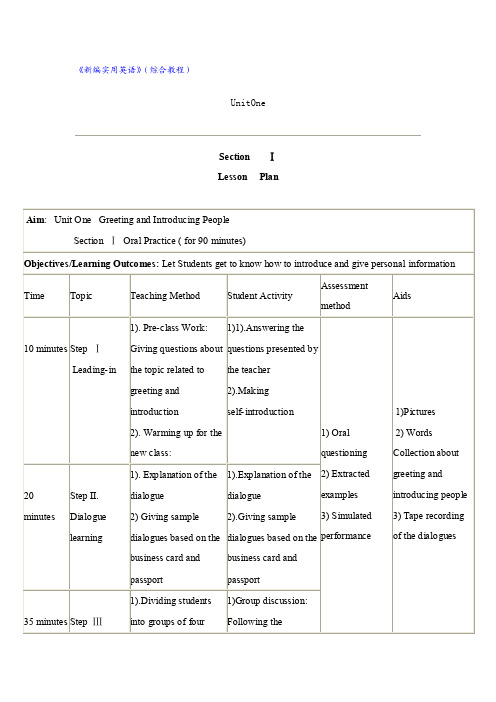
《新编实用英语》(综合教程)UnitOneSection ⅠLesson PlanContent: Section ⅠTalking face to faceAim: The topic area of Taking Face to Face in this unit is to talk about greeting people and introducing with each other. The focus of functions is to Let Students get to know how to introduce and give personal informationImportant and difficult points:Procedure and methods:Step I. Leading-in1. Pre-class Work: Giving questions about the topic related to greeting and introduction2. Warming up for the new class3. Student Activity:1).Answering the questions presented by the teacher2). Making self-introductionStep II. Dialogue learning1. Explanation of the dialogue2. Giving sample dialogues based on the business card and passport3. Student Activity:1). Listening to the tape recording of the dialogues2).Pair work: Learning the dialogues by heart and Reading out the dialogues loudly in pairs.Step ⅢActing outAfter learning the five dialogues on the book1 Dividing the students into groups of four or five2 Offering more situations for students to make dialogue3 Summarizing this part4 Student Activities:1).Group discussion: Following the dialogue and making dialogues based on the given situations2). Comments on classmates’performanceStepⅣPutting in use1. Completing and checkingInstructions: Ask students to work in groups to complete by filling in the blanks on Page 4, and then check the answers in class.2. RespondingInstructions: Ask students to practice Exercise 2 on Page 4 of the textbook orally . Offer the situation in Chinese, and ask students to give the English version, the whole class works together. After each activity, check the answers and make comments promptly.Section ⅡLesson planSection ⅡListening Practice (for 90 minutes)Objectives/Learning Outcomes: Correct understanding of the listening material about greeting and introducing peopleTime Topic Teaching Method Student Activity AssessmentmethodAids20 minutesStep ⅠListeningand decodeListen andrespond1) Introduction of listeningcomprehension2) Explanation of the dialogueand comments1) Choosing the rightwords they hear2) Answering thequestions based onthe dialogue theyhear1) Questioning thestudents withsome words andphrases relatedwith the listeningmaterial2) Distinguishingsound -similarwords3) SimulatedperformanceTaperecording ofthedialogues15 minutes Step II.Listen andcompleteListen andjudge1) Introduction of somelistening skills: How to catchthe information you need2) Checking the answers1) Listening to thedialogue2) choosing the rightanswer for themultiple choiceexercises40 minutes Step ⅢListen andreadListen andmatch1).Explanation of the keywords2).Explanation of the listeningmaterial3).Checking the answers1) Filling in theblanks with thewords they hear2) Matching theinformation incolumn A withchoices in column B3) Writing out thegeneral idea of thepassage byContent: Section ⅡBeing All EarsAim: Make the students master more useful vocabulary phrases and sentences to express themselves in English .when they meet people and introduce with each other. Important and difficult points:1. Introduction:Listening comprehension is the receptive skill in the oral mode. When we speak of listening what we really mean is listening and understanding what we hear.In our first language, we have all the skills and background knowledge we need to understand what we hear, so we probably aren't even aware of how complex a process it is. Here we will briefly describe some of what is involved in learningto understand what we hear in a second language.2.Listening Situations:There are two kinds of listening situations in which we find ourselves:·Interactive·non-interactive.Interactive listening situations include face-to-face conversations and telephone calls, in which we are alternately listening and speaking, and in which we have a chance to ask for clarification, repetition, or slower speech from our conversation partner. Some non-interactive listening situations are listening to the radio, TV, films, lectures, orsermons. In such situations we usually don't have the opportunity to ask for clarification, slower speech or repetition.Listen for main ideas. The main ideas are the most important points the speaker wants to get across. They may be mentioned at the start or end of a talk, and repeated a number of times. Pay special attention to statements that begin with phrases such as "My point is..." or "The thing to remember is..."Give your full attention on the person who is speaking. Don't look out the window or at what else is going on in the room.Remember: time is on your side! Thoughts move about four times as fast as speech. With practice, while you are Listening you will also be able to think about what you are hearing, really understand it.Procedure and methods:Step ⅠListen and decode & Listen and respond1. Introduction of some listening skillsInstructions: Help students get to know how to distinguish sound-similar words.2. Explanation of the dialogue and commentsInstructions: In this part students must choose out the words they hear from the tape recording. After playing the tape twice, check their answers.3. RespondingInstructions: After listening to the tape for the third time, students are asked to answer the questions listed out in the textbook orally.Step II. Listen and complete & Listen and judge1. Completing after listeningInstructions: Ask students to fill in the blanks with the words they get from the tape recording after hearing it for twice.2. Judging after listeningInstructions: After students listen to the same dialogue for the third time, ask them to choose the correct answers to the given sentence.Step Ⅲ.Listen and read, Listen and match1. Explanation of the key wordsInstructions: Students are going to hear a passage with some blanks for them to fill in. Before playing the tape recording, explain some key words which will appear in it. Ask students to memorize these words.2. Explanation of the listening materialInstructions: After students finish the filling-in, explain some difficult language points in the passage.3. Matching after listeningInstructions: In this part a dialogue will be given to each of the students, after they listen to it, they are asked to match the information in Column A with the choices in Column B. Then check their answers.4. Answering questions after listening to the passage again.Instructions: In this part the students are asked to write out the general idea of the passage in one paragraph by answering some listed questions in the textbook.Step Ⅳ. Listen and conclude1. Exercises in the workbookInstructions: Give explanations to some new words in the workbook, and ask students to finish the exercises in it, then check their answers.Asking students to memorize the new words which appear in the textbookSection ⅢLesson PlanTime Topic TeachingMethodStudent ActivityAssessmentmethodAids5minutes Step ⅠLeading-in1) Revision2) Thebackgroundinformationabout thepassage3) Warming upfor the newpassages1) Reciting somesentences theyhave learned inthe previous class2).Makingself-introduction1) Oralquestioning2) Extractedexamples3)Simulatedperformance1) Mapsof theweatherforecast2)WordsCollectionaboutweather3)Taperecordingof thedialogues35 minutes Step IIComprehensionof the passage1) Textpresentation andlanguage points2) Asking somequestions aboutthe passage3) Summarizingthe passage1) Listening tothe tape recordingof the passage2) Answering thequestions3) Retelling thepassage in a fewword20 minutes Step ⅢFurther exercise1) Conductingstudents to finishthe exercises onpage 102) Explanation ofthe difficult partsof the exercise3) Checking the1) .Finishing theexercise on page102).Learning theusage of somekey wordsContent: Section ⅢReading Comprehension“Maintaining a Sharp Eye”. The students will first read the two useful passages of "The way Americans Greet" and "A little About Me". The teacher will interpret the new words and structures in detail. Finally help the students do the exercises.Aim: Master the key words and structures, and learn something about the way American great This will give them an idea of how to greet foreigners especially American and how to introduce themselves.Important and difficult pointsProcedure and methods:Step I. Leading in1. Revision of the previous lesson2. Warming up for the new passages3. Student Activity:1).Reciting some sentences they have learned in the previous class2).Making self-introductionStep II Comprehension of the passage1.Explanation of the new words and language points in the passageA. Important Words and PhrasesInstructions: Give some examples to explain the difficult words. Ask students to make sentences with the words they just learn.1). greet: v. say words of welcome to, express one‘s feelings on receiving sb. 问候,致意,打招呼e.g.: It is important for the students to learn how to greet people in English.The American professor greets his students with “Morning!”2).relationship:n. particular connection or relation; instance of being related 关系,联系e.g.: He is making efforts to develop a lasting relationship with Lizzy.3).wave: v. move one‘s hand to and fro, up and down (to give a greeting or say goodbye) 挥手致意,舞动e.g.: Jean waved goodbye to her Chinese friends,4). leave: v. go away from; fail or neglect to take/bring sth. 离开,出发;留下,遗忘e.g.: The beautiful city has left a deep impression upon our mind.5).impression: n. effect produced on the mind or feelings 印象e.g.: His speech made a strong impression upon the audience. 他的演说给听众留下了深刻的印象。
- 1、下载文档前请自行甄别文档内容的完整性,平台不提供额外的编辑、内容补充、找答案等附加服务。
- 2、"仅部分预览"的文档,不可在线预览部分如存在完整性等问题,可反馈申请退款(可完整预览的文档不适用该条件!)。
- 3、如文档侵犯您的权益,请联系客服反馈,我们会尽快为您处理(人工客服工作时间:9:00-18:30)。
先生 名片
5 Unit | One
3) Introducing Friends A: May I introduce my friend Lily? She is from Class One. B: Oh, hello, Lily. I'm Jack from Class Two. C: Nice to meet you. Professor B: Nice to meet you, too.
You: My 3 __p_le_a_s_u__re_____. Welcome to China. My name is Zhang Lin.
4 ___H_e_r_e_i_s_____ my card. Mr. Smith: Thank you. Here is mine. And 5 ____th_i_s_i_s______ my wife.
Trying Your Hand
3 Unit | One
Imitating Mini-Talks Acting out the Tasks Studying Business Cards Following Sample Dialogues Putting Language to Use
4 Unit | One
8 Unit | One
Back
9 Unit | One
Following Sample Dialogues
4 Read the following sample dialogues and try to perform your own tasks.
10 Unit | One源自Back11 Unit | One
very good time. B: I'm glad you enjoyed it. A: Thanks for inviting me. B: Thanks for coming.
介绍 教授 夫人
Back
6 Unit | One
Window on Key Words
Acting out the Tasks
2 Work in pairs and act out the tasks by following the above mini-talks.
Back
7 Unit | One
Studying Business Cards
3 Business cards are very useful for introducing people. Read the following cards carefully and try to use the information to practice short dialogues.
You: Hello, are you Prof. Smith from the United States?
Mr. Smith: Yes, Robert Smith. Please call me 1 ___R__o_b_e_rt______.
2 ___T_h_a_n_k__y_o_u___ for meeting me at the airport.
You: 6 H__o_w__d_o_y_o_u__d_o__, Mrs. Smith?
Mrs. Smith: How do you do? It's nice to meet you. Please 7 ___c_a_l_l _m_e______ Mary.
You: How was the 8 ___j_o_u_rn__e_y_____, Mary?
Imitating Mini-Talks
1 Work in pairs. Practice the following mini-talks about greeting and introducing people.
Window on Key Words
1) Meeting People for the First Time A: Hello, Mr. David Green! I'm Lily Zhang. B: Hi, Miss Zhang! Nice to meet you. A: Nice to meet you, too. Mr. Green. B: Oh, please call me David.
2) Exchanging BBuussinineesssCCaarrddss A: How do you do, Prof. White? Glad to meet you. B: How do you do, Prof. Wang? Glad to meet you, too. A: Here is my business card. B: Thanks. This is mine.
精选课件
1 Unit | One
2 Unit | One
Talking Face to Face
Section Ⅰ
Section Ⅱ
Being All Ears
Section Ⅲ
Contents
Section Ⅴ
Appreciating Culture Tips
Section Ⅳ
Maintaining a Sharp Eye
Putting Language to Use
5 Imagine you are meeting an English teacher from the USA at the airport. Read aloud the following dialogue with your partner by putting in the missing words.
4) Meeting People Again A: Hello, Professor Waters. How are you these days? B: Fine, thanks. And you? A: I'm fine, too.
5) Saying Goodbye A: Thank you for the nice party, Mrs. Lin. We really had a
